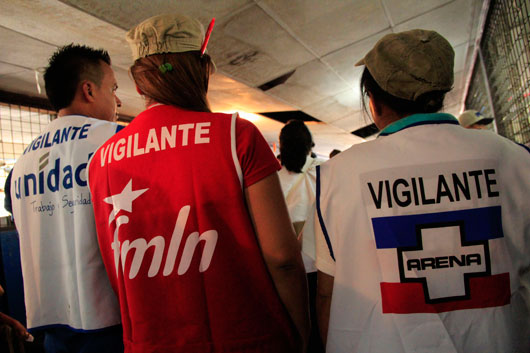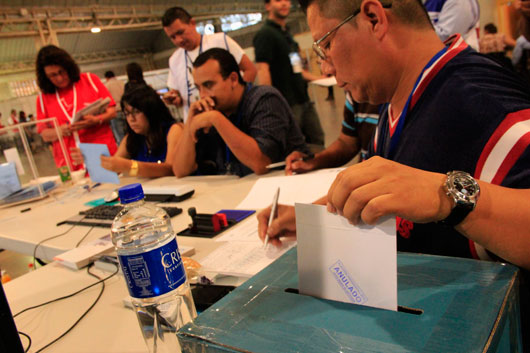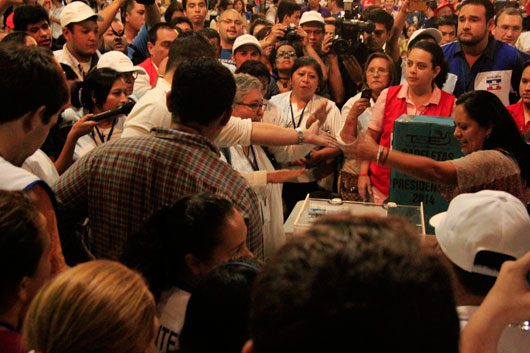
They were fighting in election headquarters, the votes of overseas Salvadorans piled on the table, caught in a disagreement that may have been procedural, was probably political, and was definitely maddening.
Each of the twenty-one tables in the hanger-like room had four young people, early twenties at most, drawn from four different political parties but dressed in plain clothes with no visible affiliation. Shifting crowds of party representatives and neutral observers watched their every step, listened to their every word. It was democracy on a national scale, and at the table level, as the decision of each foursome whether or not to nullify a vote stood as final.
And votes were being nullified. A lot of them.

On the surface it was a procedural problem. Many of the overseas voters, doing this for the first time and in a brand new system, had enclosed the materials incorrectly, their personal identification slip mixed in with the ballot. If that’s the case, do you throw it out, or help them? And if so, how much?
The deeper issue was that the vast majority of expats belong to one particular party, who was extremely close to winning the election. Coincidentally enough, it was the other party whose representatives wanted to nullify tall stacks of ballots.
Voices were calm. Voices were relentless. Voices were sometimes raised. Three of the tables felt like war zones.

I saw one guy, full machismo persona, shout one word at a women. One word. I have never seen a crowd gather so quickly. He tried to look cocky and amused, but by the time she was done with him, there wasn’t much left for the others to fight over.
Don’t piss off a Salvadoreña.
Everyone’s feet hurt, there was minimal food available, and we’d been trapped in this holding cell of democracy for hours with no resolution in sight. It was disappointing to see partisan gridlock after so much hope that day. And it had been a long one.
I’d been woken at 4:00 AM by the neighbors leaving. Salvadorans, like most of Latin America, are incredibly polite and courteous, with one raging exception: a shocking disregard for the slumber of others. And I wake up cranky.
After a familiar Cliff Bar breakfast that felt like mouth cement, we drove an hour to Ahuachapan, to visit our first voting center before heading to a breakfast of pupusas and Salvadoran coffee. Everything was peaceful in Ahuachapan, but we guessed that might be the hour. Trouble-makers sleep in, right?
But back in San Salvador, the second voting center was just as peaceful. And the third. The fourth, fifth, and sixth were after lunch, and the schoolyards and parks seemed more like group picnics than hotly contested political turbulence.
My press credentials had not been completed in time, so I was prohibited from taking pictures inside the voting areas. With everything so peaceful and no camera in hand I joined the picnic, getting to know our police escort. His name is Gerardo, he’s from San Miguel, doesn’t have children, and eventually confided that he has a crush on Eva Longoria. I countered with Penelope Cruz, and we both happily agreed on Salma Hayek.
Salma always wins, with 100% of precincts reporting.
Things went so well all day, that back at headquarters it was driving our organization bodyguard crazy. “It’s too quiet,” he told me, rocking from foot to foot. “It’s never this tranquilo, it means they’re either rigging the election, or planning something big.” His hand twitched towards the bulge at the small of his back whenever a new car alarm would go off.
Car alarms always lose, with 99% of precincts reporting.
The polls had almost closed when we got the call that there was a problem with the absentee ballots. White vests reading Observador Internacional piled into vans, and the armada flew across San Salvador to the convention center, where the fighting at the twenty-one tables was already underway. The people had done their part in peace, now the partisans were threatening disfunction.
A couple hundred repetitive pictures and a growing headache later, not much had changed.
I was standing back, listening to the debate at one table, feeling a little sad about it, when one of my new compañeros came to stand beside me. This man deserves a book, a movie, and a talk show. He fought in the war, to the bitter end, then fled the repressive regime that came after demobilization. He went to America, earned a PhD from the University of Chicago, and a second one from Northwestern, then became a priest. He’s the type of guy that everyone immediately likes, and I was no exception.
My current Code of Ethics says I can’t say “no” to any strange traveling suggestions, so whenever he would say “Vamonos Timoteo, let’s go…” I would say “si” and off we’d go to explore markets, drink smoothies made from unknown ingredients, and eat mysterious fruits from fly-ridden tables. It drove the bodyguards nuts. The closest I came to breaking my code was when a smoothie’s first ingredient was a raw egg, but it was delicious. (Add orange juice, vanilla, cinnamon, and possibly another ingredient or two. Drink, enjoy, and don’t blame me if you hurl.)
Now he was standing beside me, not saying anything, watching with an expression of equanimity, and it hit me.
When he was their age, he was carrying a gun, his discussions carried by bullets. These kids had pens in their hands, passion and dedication in their discourse, and all of them were devoted to the principle of democracy, and the future of their country.
I’ve quickly come to love the Salvadoran people, who have suffered so much, and have so many challenges left to face. This period, the last few years and hopefully the next many, is an opportunity to progress past the crimes and injustices of the past, an incredibly daunting prospect.
But here they were, Salvadorans abroad going through the Kafkaesque process to register and vote, Salvadorans at home lining up to peacefully exercise that right they fought so hard for, and the young leaders of the nation, here on a Sunday night, battling it out with words for their future. A few procedural bumps on the road are to be expected, and I have every faith that, given the chance, the Salvadoran people will navigate that path.
In fact, I think America could take a page from the Salvadorans. When the registration and annulation phase was completed, the votes were counted, together, by a balanced group of humans. There were no mysterious machines that routinely fail when tested, no opaque process where we wonder if the lever we pulled really connects to anything, or if it’s like the “close door” button on the elevator, there just to make us feel better.
I asked one man if he thought a corporation was a person and he looked at me like I was loco.
The Salvadoran constitution requires a party to get a majority to win the election. The FMLN received over 49% of the vote, but less than 50% +1, so there will be a second, runoff election between the FMLN and the second place party, ARENA, on March 9. The third substantial party, UNIDAD, was also Rightwing, and the question of where those voters will gravitate is unknown, as both parties scramble to woo their 11%.
The people of El Salvador have made incredible gains over the past twenty years, the last five, and the last two days. I look forward to the results of the second round, held fairly, transparently, and democratically. I would wish the people of El Salvador luck next month, but with the resolve and dedication I saw, they don’t need it.
So instead I say: congratulations.
Read Ethical Traveler's Reprint Policy.
